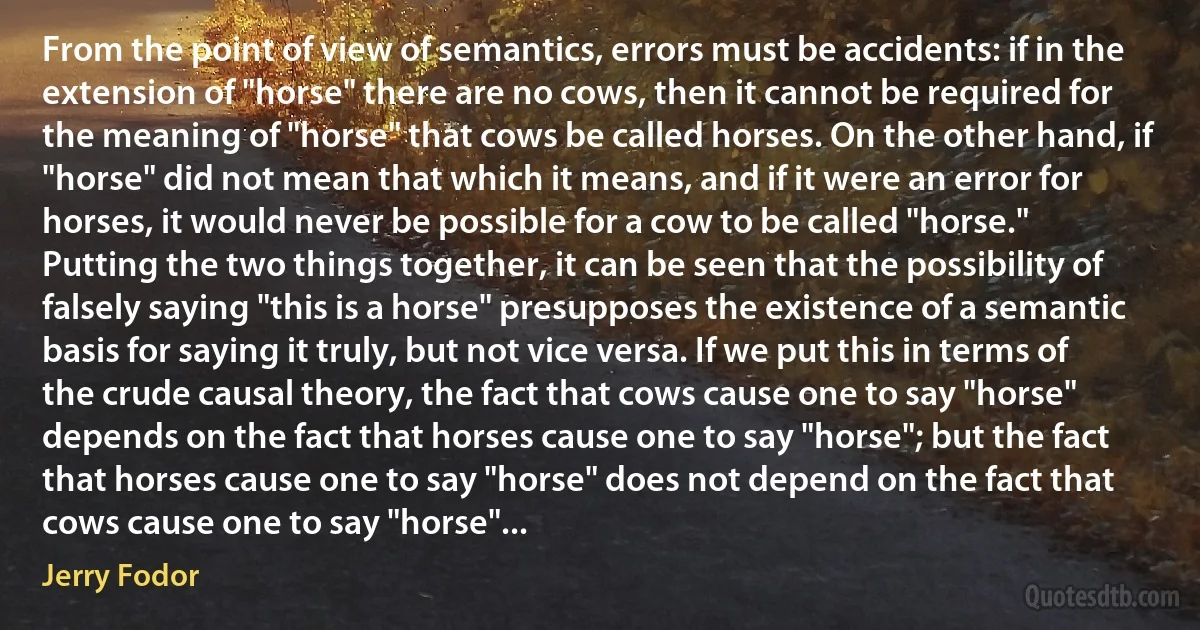
From the point of view of semantics, errors must be accidents: if in the extension of "horse" there are no cows, then it cannot be required for the meaning of "horse" that cows be called horses. On the other hand, if "horse" did not mean that which it means, and if it were an error for horses, it would never be possible for a cow to be called "horse." Putting the two things together, it can be seen that the possibility of falsely saying "this is a horse" presupposes the existence of a semantic basis for saying it truly, but not vice versa. If we put this in terms of the crude causal theory, the fact that cows cause one to say "horse" depends on the fact that horses cause one to say "horse"; but the fact that horses cause one to say "horse" does not depend on the fact that cows cause one to say "horse"...
Jerry FodorRelated topics
causal cause cow cows crude error extension hand horse meaning mean point possibility possible putting say saying seen vice view means things semantics semanticRelated quotes
France isn't France anymore. We're not going. And so many people are saying that. Look at what's going on with Germany. Look at what's happening with Germany. Look at the crime; look at the problems. We have enough problems in our country right now. We don't need additional problems, folks. We don't need additional problems. And for all we know, this could be the great Trojan Horse. This could be. We don't know who these people are. ... We have to get smart, folks. We don't need the problems - and we've already got those problems, just so you understand. Because they're coming into the country, they're being put where nobody even knows where they are. It's like, if I were the enemy, I would say, I can't believe they're that stupid. They're taking my people and they're putting them all over the place, because you have great military right here.

Donald Trump
We never fully understood why Milosevic decided to give Sarajevo to the Muslims. But in retrospect, the best explanation may be that he was fed up with the Bosnian Serbs and had decided to weaken their Pale base by giving away the Serb-controlled part of Sarajevo. By giving the Federation all of Bosnia's capital, perhaps Milosevic wanted to weaken Karadzic and stregthen the Serbs in other parts of Bosnia, especially Banja Luka. This explanation was consistent with one of Milosevic's main themes at Dayton: that the Bosnian Serb leadership had become an impediment, even though he had earlier made common cause with them. Milosevic had often talked of strengthening the "intellectuals" and businessmen of Banja Luka in order to weaken Pale; now he seemed to be putting his theory into action.

Richard Holbrooke
That's all window dressing. That's not fundamental. That's not getting at change and the transformation that must take place. Sure we have to solve problems. Certainly stamp out the fire. Stamp out the fire and get nowhere. Stamp out the fires puts us back to where we were in the first place. Taking action on the basis of results without theory of knowledge, without theory of variation, without knowledge about a system. Anything goes wrong, do something about it, overreacting; acting without knowledge, the effect is to make things worse. With the best of intentions and best efforts, managing by results is, in effect, exactly the same, as Dr. Myron Tribus put it, while driving your automobile, keeping your eye on the rear view mirror, what would happen? And that's what management by results is, keeping your eye on results.

W. Edwards Deming
We've already said that it's the Holy Spirit who gives us the ultimate assurance of Christianity's truth. Therefore, the only role left for argument and evidence to play is a subsidiary role. I think Martin Luther correctly distinguished between what he called the magisterial and ministerial uses of reason. The magisterial use of reason occurs when reason stands over and above the gospel like a magistrate and judges it on the basis of argument and evidence. The ministerial use of reason occurs when reason submits to and serves the gospel... Should a conflict arise between the witness of the Holy Spirit to the fundamental truth of the Christian faith and beliefs based on argument and evidence, then it is the former which must take precedence over the latter, not vice versa.

William Lane Craig
I am neither a saint nor a theologian. To me, good works are more important than theology. We all know that religion has been historically, and still is today, a cause of great evil as well as great good in human affairs. We have seen terrible wars and terrible persecutions conducted in the name of religion. We have also seen large numbers of people inspired by religion to lives of heroic virtue, bringing education and medical care to the poor, helping to abolish slavery and spread peace among nations. Religion amplifies the good and evil tendencies of individual souls. Religion will always remain a powerful force in the history of our species. To me, the meaning of progress in religion is simply this, that as we move from the past to the future the good works inspired by religion should more and more prevail over the evil.

Freeman Dyson
